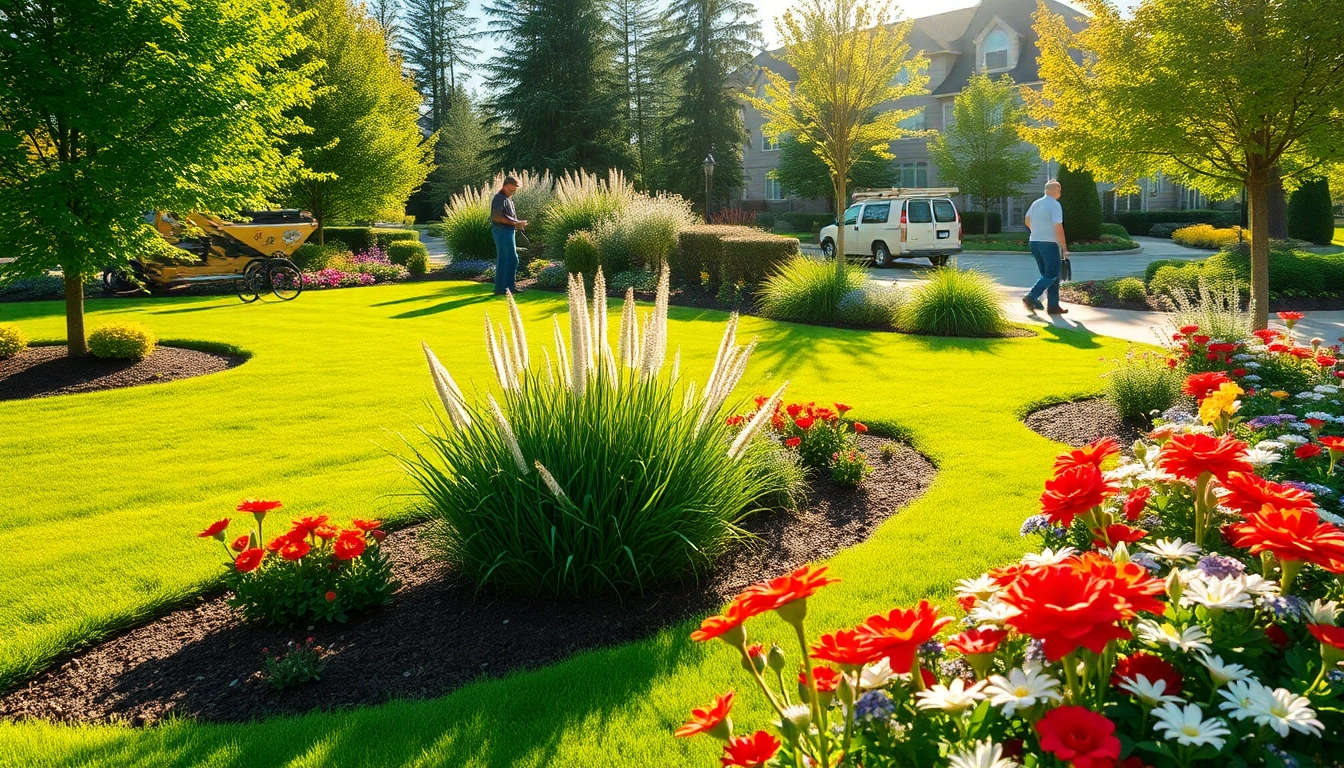Understanding the Role of Commercial Landscaping Contractors
Commercial landscaping contractors play a pivotal role in enhancing and maintaining the outdoor spaces of businesses and institutions. These professionals specialize in creating and preserving visually appealing landscapes that not only beautify the environment but also serve functional purposes. The work they do can range from designing intricate garden layouts to installing hardscaping elements, ultimately contributing to the overall aesthetic and operational efficiency of commercial properties. When considering the value they bring, it’s crucial to understand what services they provide, the key benefits of hiring professionals, and how they can enhance property value.
What Services Do They Provide?
Commercial landscaping contractors offer a diverse array of services tailored to meet the unique needs of businesses. These services often include:
- Landscape Design: Creating functional and aesthetically pleasing designs that complement the architectural style of the property.
- Lawn Care: Regular mowing, fertilization, aeration, and pest control to maintain a healthy and lush landscape.
- Irrigation System Installation: Setting up efficient irrigation systems to ensure the landscape thrives through all seasons.
- Tree and Shrub Care: Pruning, trimming, and disease management to enhance plant health.
- Hardscaping: Installation of patios, pathways, walls, and other non-plant elements to add structure and functionality.
- Seasonal Clean-up: Preparing landscaping for seasonal changes, which may include leaf removal and snow removal in winter.
- Maintenance Contracts: Offering recurring services to keep the landscape in prime condition.
Key Benefits of Hiring Professionals
Engaging commercial landscaping contractors brings a multitude of benefits that go beyond aesthetic enhancement:
- Expert Knowledge: Professionals are well-versed in plant selection, local climate considerations, and pest management, ensuring that the landscaping thrives.
- Time Efficiency: Outsourcing landscaping allows business owners to concentrate on core operations while leaving landscaping tasks to the experts.
- Consistent Maintenance: Hiring professionals ensures regular upkeep, leading to long-lasting results.
- Innovative Solutions: Contractors offer cutting-edge designs and sustainable practices that can save money in the long run.
How They Enhance Property Value
The impact of well-maintained landscaping goes beyond immediate visual appeal. According to studies, properties with professionally designed landscapes can see a significant increase in value. Factors contributing to this include:
- First Impressions: Curb appeal is often the first interaction potential clients or customers have with a property.
- Environmental Impact: Sustainable practices like native plant installations can lower maintenance costs and enhance biodiversity.
- Long-term Investment: Investing in good landscaping can yield a return of up to 150% when properly maintained over time.
Factors to Consider When Selecting Contractors
Choosing the right commercial landscaping contractor is a critical decision that can significantly affect the outcome of your landscaping projects. Here are key factors to consider:
Assessing Experience and Expertise
When selecting a landscaping contractor, consider their experience in the industry. A contractor with several years of practice is likely familiar with challenges that may arise in landscaping projects. Look for:
- Portfolio: Review their past work to gauge design quality and project scope.
- Specialization: Ensure that they have experience with commercial properties similar to yours.
- Training and Certification: Look for contractors who have pursued additional training in landscaping design and maintenance.
Checking Credentials and Licenses
It’s vital that your contractor is properly licensed and insured. This protects both you and the contractor. Key credentials include:
- State Licensing: Most states require contractors to hold a specific license for landscaping.
- Insurance: Ensure they carry general liability and workers’ compensation insurance.
- Certifications: Seek out certifications from recognized landscaping and horticultural organizations.
Understanding Client Testimonials and Reviews
Taking the time to read client testimonials and reviews provides insight into the quality of service a contractor offers. Consider the following:
- Reputation: A contractor with positive feedback and a good reputation is more likely to provide satisfactory results.
- Case Studies: Ask for examples of case studies or references who can share their experiences.
- Communication: Notes on how the contractor communicates with clients can indicate their professionalism and responsiveness.
Common Services Offered by Commercial Landscaping Contractors
Understanding the variety of services commercial landscaping contractors offer can help you choose the right package for your needs. Below are some of the most common services provided:
Lawn Maintenance and Care
Lawn maintenance is one of the primary services offered. This includes services such as:
- Regular Mowing: Keeps the lawn at an ideal height for health and appearance.
- Fertilization: Feeding the lawn with appropriate nutrients.
- Pest Management: Identifying and controlling pests that would harm the lawn.
- Weed Control: Minimizing unwanted plants that can compete with the grass.
Hardscaping Elements for Aesthetic Appeal
Hardscaping involves the use of non-plant elements in landscaping designs. Some popular hardscaping features include:
- Patios and Decks: Providing spaces for outdoor relaxation and dining.
- Walkways: Clear, attractive paths for pedestrians throughout the property.
- Retaining Walls: Utilized for erosion control and to create tiered landscapes.
- Water Features: Fountains, ponds, or other water elements that provide a serene atmosphere.
Sustainable Practices in Landscaping
More commercial landscapes are adopting sustainable practices, aiming for environmental stewardship alongside beauty. These practices include:
- Xeriscaping: Designing landscapes with drought-tolerant plants to minimize water usage.
- Native Plant Selection: Choosing plants that naturally thrive in the region, reducing maintenance and water needs.
- Recycling Materials: Utilizing recycled or biodegradable materials whenever possible in hardscaping projects.
- Integrated Pest Management (IPM): Using natural pest prevention methods to decrease reliance on chemicals.
Budgeting for Landscaping Services
Creating a realistic budget for landscaping can help you manage financial expectations. Below are essential considerations when budgeting for landscaping services:
Understanding Pricing Structures
The pricing for commercial landscaping can vary significantly based on the services provided. Often, contractors offer different pricing structures, which may include:
- Flat Rate: A predetermined cost for specific services.
- Hourly Rate: Some contractors bill by the hour, which can vary based on the type of service.
- Monthly Contracts: Offering regular maintenance at a set monthly fee.
Finding Cost-effective Solutions
While quality is paramount, finding cost-effective solutions is also essential. Strategies include:
- Bundling Services: Hiring a contractor for multiple services can sometimes lead to discounted rates.
- Seasonal Programs: Utilizing seasonal promotions or off-peak rates for services can lead to savings.
- Do It Yourself: For minor tasks, consider handling some basic maintenance yourself under the guidance of professional recommendations.
Investment vs. Returns: Is It Worth It?
Investing in quality landscaping can yield substantial returns. Research shows that well-maintained landscapes can improve property values and customer appeal. Factors to consider include:
- Return on Investment: Expect a return ranging from 100% to 200% depending on your geographic area and market conditions.
- Increased Foot Traffic: An appealing landscape can attract more customers, directly influencing sales growth.
- Loyalty and Reputation: Businesses are often perceived as more credible when their premises are well-kept.
Measuring Success with Your Landscaping Projects
To ensure that your investment in landscaping is paying off, setting measurable performance metrics is essential. This section explores how to evaluate success.
Setting Performance Metrics
Establishing clear metrics is crucial for assessing the success of your landscaping projects. Consider tracking:
- Aesthetic Improvement: Regularly review the visual impact and condition of the landscaping.
- Customer Feedback: Solicit feedback from customers and staff regarding their impression of the landscape.
- Cultural Metrics: Measure changes in visitor or customer numbers before and after landscaping improvements.
Long-term Maintenance Plans
For successful long-term landscaping, consistent maintenance is vital. Strategies include:
- Annual Assessments: Periodically review landscape health and design effectiveness.
- Routine Service Agreements: Establish contracts with your chosen landscaping contractors for regular maintenance.
- Seasonal Adjustments: Adapt the landscape and maintenance practices according to seasonal changes.
Feedback and Improvement Strategies
Collecting feedback is important to refine landscaping efforts continually. Implement strategies such as:
- Surveys: Create customer satisfaction surveys specific to landscaping aesthetics.
- Regular Meetings: Host discussions with your landscaping team to integrate new ideas and improvements.
- Site Visits: Conduct walkthroughs to observe potential areas for enhancement.


